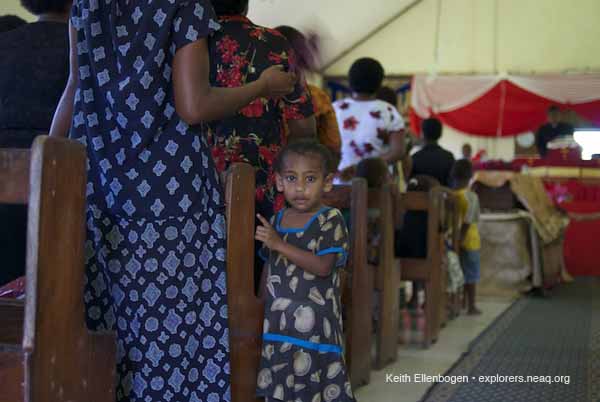We've been living in Nasavu village for almost a week and are getting accustomed to its daily rhythms. The roosters crow when the tides go out--lately this has been starting from about 3 a.m. Before dawn the women are up preparing scones and cassava cakes for breakfast and we can smell the smoke of their fires. The kids peer into my tent to see when I will crawl out to face the day. Once the hustle and bustle begins, it is non-stop activity until the sun goes down.
(Photo: Keith Ellenbogen)
Nasavu village is extra busy this week as guests have been arriving for a funeral today for a village elder who passed away on Tuesday night. On top of their regular household chores, the women have been weaving mats to present to the bereaved family during a reguregu, when formal condolences are exchanged. A cow has been slaughtered, a pig hog-tied, and men have passed by with hundreds of pounds of taro, which will all go into an earth oven for a traditional lovo feast. As I look through the wooden posts of our veranda, a chain of women and girls are walking by carrying colorful bula cloth draped between them like a long chain of flags.
A Fijian funeral seems less a sad remembrance than a celebration of a person's life, giving a reason for all of the neighboring clans to gather and reconnect. It would be inappropriate for us to conduct dive surveys today, so instead, to pay our respects to the family, we attended the church service and burial. All of the pews were packed and voices rang out in perfect harmony in hymn after hymn. Keith was invited up to the pulpit to get a better view from his lens and remained wedged between the junior pastors during the sermon.
Since it was Keith's last day with our team, in the afternoon we got permission to take out one of our boats so he could take the opportunity to photograph local fishermen in action. Most of the fishing from Nasavu village is done from a makeshift bamboo raft (bilibili), from which women cast hand lines and men thrust their hand spears.
Bilibili with fisherman (Photo: Keith Ellenbogen)
Some of the more intrepid men venture further offshore with their spearguns to free dive for their dinner.
(Photos: Keith Ellenbogen)
A skilled spearfisherman can be highly efficient at removing catch from the reef. In Fiji, many spearfishers deliberately target surgeonfish and parrotfish as they are resting on the reef at night, thus very easy prey. These fish are important grazers of algae on coral reefs, a behavior which provides a critical function to maintaining healthy reef systems. Studies by the Wildlife Conservation Society (WCS) have found that when fishers have direct access to markets, these fish are caught at levels 3 - 4 times higher than all other catch. Although currently, levels of fishing in Bua Province seem generally sustainably, as there becomes more opportunities to sell fish in the future, it may be wise to begin implementing specific bans on harvesting these herbivorous fish which provide such a critical function to the ecosystem.
After returning to the village to shower and eat, we headed over to the house across the courtyard for Keith's last kava session in the village. The men had been sitting around the tanoa for most of the day. Their eyes drooped and shoulders hunched as the let themselves slide down the wall. As the night grew later and we grew more weary ourselves, we bid moce (goodnight) to our new friends and stepped back out under the stars.
-Stacy Jupiter, PhD








0 comments:
Post a Comment